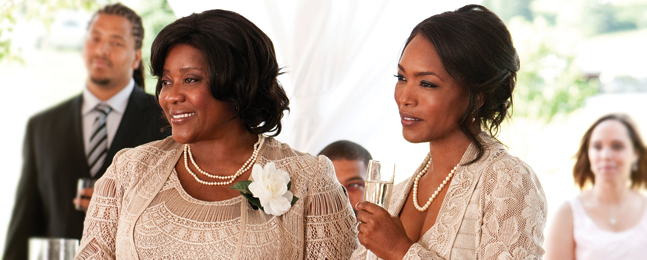Achieving Devinity
Even if you don’t know this Brandeis actress’ name, you’ll recognize her face.

Courtesy of Tristar Pictures
Loretta Devine, left, and Angela Bassett
by THERESA PEASE
Loretta Devine is a glamorous cabaret star in a trio that looks, sings and acts like the Supremes. No, wait, she’s an overprotective mom willing to throw her adult son’s hopes and dreams under the bus to keep him near her. On third thought, she’s a hard-working nurse in a metropolitan hospital who spends her free time trying to teach inner-city women about AIDS.
What Devine, M.F.A.’76, really is, is a well-trained and energetic performer who can adapt herself, chameleon-like, into any identity she chooses. Her immunity to typecasting makes her one of the most in-demand and beloved character actresses in the film and TV industry.
With her giant eyes, baby-doll cheeks and soft, high-pitched voice, Devine has graced the screen in TV series that include “Grey’s Anatomy,” “Boston Public” and “Eli Stone.” Now closing in on the 100-movie mark (one website clocked her at 93 a few months back), she had two premieres within a fortnight this spring: one in Tyler Perry’s comedy “Madea’s Big Happy Family” and one as Pam, the leading man’s villainous protective mama in the romantic hit “Jumping the Broom.”
“Pam’s a real mean woman,” Devine quips, “but she’s a mean woman I can understand. I don’t take on a role unless I can identify emotionally with the character.”
In June, the 61-year-old dynamo was awaiting release of her new dramatic film, Robert Townsend’s “The Discarded Boys,” and was in rehearsal for “State of Georgia,” a sitcom scheduled to begin airing on ABC Family this summer. In the latter, she portrays Honey, the fabulously wealthy and sophisticated aunt of the title character, an aspiring actress played by Raven-Symoné (“That’s So Raven”).
Devine got her start by singing in a Houston church choir and acting in school plays. After graduating from the University of Houston and teaching theater, English and Swahili at a black arts center, she was offered a part in the 1975 New York production of “For Colored Girls Who Have Considered Suicide When the Rainbow Is Enuf.”
She turned the role down, deciding to pursue a graduate degree at Brandeis instead. But her plane was delayed en route to her on-campus audition. Luckily, theater department chair Charles Moore was already at Logan Airport — on his way out of town.
“We met up at the airport, and I auditioned right there. I did a monologue in which this woman was trying to persuade a man not to leave her, and I got right down on my knees in front of Charlie Moore, begging and crying. Everyone was looking at us,” she coos in her Betty Boop voice. “I got into the university.”
At Brandeis in the 1970s, roles for black women were scarce — it was before “color-blind” casting and even before the drama department had consciously embarked on socially relevant play selection. “They didn’t know what to do with me. I acted as a maid in one show, and I played one of the three witches in ‘Macbeth,’” confides Devine.
She says this uncomplainingly, adding, “Brandeis was a great experience for me. The principles I learned there and the work ethic I acquired have helped me sustain my career. I learned how to develop characters. It’s made all the difference in the world.”
Originally, Devine planned to return to Houston and start a theater company. But, she says, “You can make all the plans you want. Then God laughs at you, and your life goes ahead and does what it’s going to do.”
What her life did was propel her to a national prominence few character actors achieve. In 1981, she was cast as Lorrell (the counterpart of Supremes singer Mary Wilson) in Michael Bennett’s Tony Award-winning Best Musical “Dreamgirls.” She followed this up with another Broadway musical, Bob Fosse’s “Big Deal.”
After creating other memorable roles on both stage and screen, she was invited in 1995 to co-star with Whitney Houston, Angela Bassett and Gregory Hines in “Waiting to Exhale.” The part won her an NAACP Image Award for Best Supporting Actress. This year, she’ll update the role as director Forest Whitaker mounts “Waiting to Exhale II,” showing the same characters 20 years later.
Among the scores of roles she’s played, which are her favorites? “Gloria in ‘Waiting to Exhale’ is one. Another was the part of a mentally slow woman in the made-for-TV movie ‘Funny Valentines,’ with Alfre Woodard,” Devine says. She also enjoyed portraying a troubled, rural alcoholic in the independent release “Dirty Laundry.”
And, closing a circle that began when she declined to play in “For Colored Girls” in New York decades ago, Devine turned in a blockbuster performance as Juanita, the nurse in Tyler Perry’s fall 2010 film remake of that show.
Though Devine insists she is not a star, a host of admirers follows her every move on Facebook, commenting on her performances in popular dramatic and comedic offerings that include “I Am Sam,” “What Women Want,” “Kingdom Come” and “Beverly Hills Chihuahua.” What’s more, she is frequently interrupted in public places by folks who want her to sign an autograph or pose for a picture with them. Is it irksome? “It’s an honor,” she says. “Usually it’s an indication that you have touched somebody, and that’s what you’re working for.”
